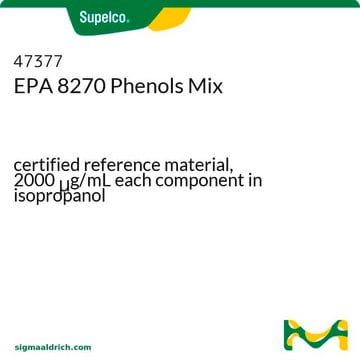24940
4-Chloro-3-methylphenol
≥98.0% (HPLC)
Synonym(s):
4-Chloro-m-cresol, PCMC
About This Item
Recommended Products
Quality Level
Assay
≥98.0% (HPLC)
form
pellets
bp
235 °C (lit.)
mp
63-65 °C (lit.)
solubility
methanol: soluble 1 g/10 mL, clear, colorless
water: soluble
SMILES string
Cc1cc(O)ccc1Cl
InChI
1S/C7H7ClO/c1-5-4-6(9)2-3-7(5)8/h2-4,9H,1H3
InChI key
CFKMVGJGLGKFKI-UHFFFAOYSA-N
Looking for similar products? Visit Product Comparison Guide
General description
Application
Signal Word
Danger
Hazard Statements
Precautionary Statements
Hazard Classifications
Acute Tox. 4 Oral - Aquatic Acute 1 - Aquatic Chronic 3 - Eye Dam. 1 - Skin Corr. 1C - Skin Sens. 1B - STOT SE 3
Target Organs
Respiratory system
Storage Class Code
6.1A - Combustible acute toxic Cat. 1 and 2 / very toxic hazardous materials
WGK
WGK 2
Flash Point(F)
244.4 °F - closed cup
Flash Point(C)
118.0 °C - closed cup
Personal Protective Equipment
Certificates of Analysis (COA)
Search for Certificates of Analysis (COA) by entering the products Lot/Batch Number. Lot and Batch Numbers can be found on a product’s label following the words ‘Lot’ or ‘Batch’.
Already Own This Product?
Find documentation for the products that you have recently purchased in the Document Library.
Our team of scientists has experience in all areas of research including Life Science, Material Science, Chemical Synthesis, Chromatography, Analytical and many others.
Contact Technical Service









